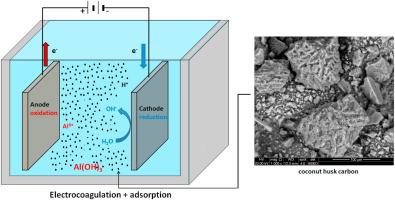Journal of Water Process Engineering ( IF 6.3 ) Pub Date : 2020-06-26 , DOI: 10.1016/j.jwpe.2020.101442 Elbert M. Nigri , André L.A. Santos , Sônia D.F. Rocha

|
The generation of liquid effluents with high organic and inorganic load in the petroleum industry requires proper treatment in order to prevent environmental pollution. Commonly, refractory organic compounds, which are not easily degraded by conventional methods, require an advanced treatment step. In addition, the inorganic content may negatively interfere with the treatment process due to scaling formation derived from the precipitation of low solubility compounds, primarily strontium and calcium-based salts. The present study aims at the removal of fouling metals such as calcium and strontium and refractory organic matter from the oil industry effluent by electrocoagulation associated with adsorption using coconut husk carbon considering the context of zero liquid discharge. Simultaneous electrocoagulation associated with adsorption presented an economy of the treatment time and capital cost in relation to the process carried out by individual steps of adsorption followed by electrocoagulation, because the efficiencies were similar. The treatment resulted in a residual of 25 mg(O2).L−1 (52 % removal) of organic matter measured as COD, 88 % of calcium removal (residual of 6.0 mg.L−1) and 72 % of strontium removal (residual of 0.4 mg.L–1), which improved the quality of the recovered water. In addition, it is noted that the adsorption process removed the organic compounds preferably while the metals were removed by electrocoagulation.
中文翻译:

通过同时电凝和吸附去除石油工业废水中的有机化合物,钙和锶
为了防止环境污染,在石油工业中产生具有高有机和无机负荷的液体废水需要进行适当的处理。通常,难以通过常规方法降解的难熔有机化合物需要高级处理步骤。此外,由于低溶解性化合物(主要是锶和钙基盐)的沉淀而导致结垢,无机物含量可能会对处理过程产生不利影响。本研究的目的是考虑到零液体排放的背景下,通过使用椰子壳碳进行吸附与吸附相关的电凝,去除了石油工业废水中的结垢金属,例如钙和锶以及难熔有机物。与吸附相关的同时电凝相对于由吸附的各个步骤随后进行电凝所进行的方法而言,节省了处理时间和资金成本,因为效率是相似的。处理导致残留25 mg(O2).L -1(52%的去除率)以COD表示,88%的钙去除(6.0 mg.L -1残留)和72%的锶去除(0.4 mg.L –1的残留),从而提高了回收水的质量。另外,应注意,吸附过程优选除去有机化合物,同时通过电凝除去金属。











































 京公网安备 11010802027423号
京公网安备 11010802027423号